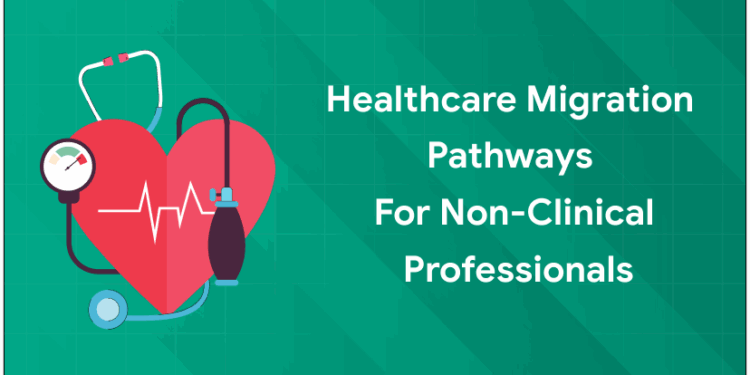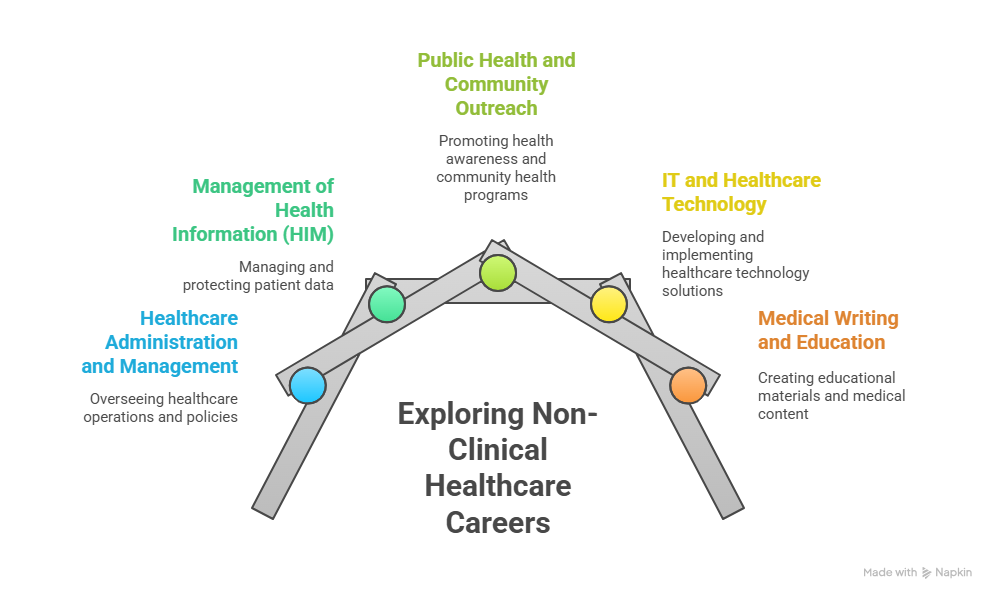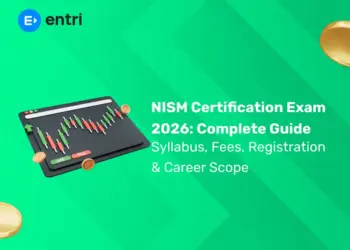Table of Contents
Patients being treated by physicians and nurses is frequently the first picture that people get when they think of healthcare. But the healthcare sector is far more expansive, including a wide range of non-clinical positions that are vital to the operation of hospitals and the health system as a whole. For those who wish to make a contribution to the healthcare industry without providing direct patient care, these alternatives are ideal. A glimpse into the varied and fulfilling realm of non-clinical healthcare positions.
Non-Clinical Healthcare Jobs:
Employment in healthcare that don’t require direct patient contact are known as non-clinical employment. Rather, these experts concentrate on fields like research, education, technology, and administration, making sure the healthcare system runs well.
Top Non-Clinical Healthcare Careers
1: What is the primary role of a hospital administrator?
Healthcare Administration and Management
Hospitals, clinics, and other medical institutions are managed by healthcare administrators. To guarantee efficient operations, they manage strategic planning, compliance, staffing, and budgeting.
- Role: Medical Office Manager, Practice Manager, and Hospital Administrator.
- Skills Required: Leadership, organizational abilities, and familiarity with healthcare regulations are required.
Management of Health Information (HIM)
HIM specialists oversee patient data and medical records, guaranteeing its security, correctness, and adherence to laws such as HIPAA and GDPR.
- Role: Health informatics specialists, medical coders, and HIM managers are important roles.
- Skills Required: Proficiency in health IT systems, data analysis, and attention to detail are required.
Public Health and Community Outreach
Public health experts create and carry out initiatives to enhance community health with an emphasis on education and prevention.
- Important Positions: Public health advisor, health educator, and epidemiologist.
- Skills needed: Project management, communication, and analytical thinking are required.
IT and Healthcare Technology
IT positions are essential for maintaining patient care systems as healthcare grows more technologically advanced.
- Important Positions: Biomedical Engineer, Telehealth Coordinator, and Health IT Specialist.
- Skills needed: Technical know-how, problem-solving abilities, and technological flexibility are required.
Medical Writing and Education
These positions entail producing information to inform the public or medical experts about various medical subjects.
- Important Positions: Training Specialist, Clinical Educator, and Medical Writer.
- Skills Required: Proficiency in writing, medical knowledge, and educational abilities are required.
Hospital Administration Course with Assured Career Growth
Hospital Administration Course by Entri App: Master essential healthcare management skills, gain certification, and secure top roles in leading hospitals
Join Now!The Importance of Non-Clinical Roles
Enhancing Operational Efficiency
Healthcare providers can concentrate on patient care without being distracted by administrative or technical tasks thanks to non-clinical personnel.
Promoting Innovation
Non-clinical positions are at the vanguard of healthcare innovation, from building AI-driven diagnostic tools to designing telemedicine platforms.
Assisting with Public Health Objectives
Large-scale illness prevention and wellness promotion are greatly aided by non-clinical staff in public health and education.
Why Consider a Non-Clinical Healthcare Career?
- Numerous Opportunities: The industry provides positions for people with a range of experiences, including those in business, IT, education, and public policy.
- Career Growth: Non-clinical positions frequently offer clear career trajectories, including chances to move into specialized or leadership positions.
- Work-Life Balance: Compared to clinical employment, the schedules of many non-clinical roles are more predictable.
- Meaningful Impact: By making a substantial contribution to the healthcare environment, these positions indirectly guarantee that patients receive high-quality care.
How to Enter the Non-Clinical Healthcare Field
- Education and Training: Get degrees or certifications in public health, IT, or health administration, among other pertinent professions.
- Skill Development: Develop your abilities in areas such as leadership, project management, and data analysis.
- Networking: To make connections with professionals in non-clinical roles, join healthcare associations and go to industry events.
- Volunteering and internships: To establish a strong foundation, obtain experience working in non-clinical contexts.
Hospital Administration Course with Assured Career Growth
Hospital Administration Course by Entri App: Master essential healthcare management skills, gain certification, and secure top roles in leading hospitals
Join Now!Qualifications and Skills Required
-
Communication:
Non-clinical employees must be able to clearly and sympathetically convey difficult information, especially when interacting with patients. This covers both verbal and written communication, as well as the capacity to modify one’s communication style for various audiences.
-
Organizational Skills:
Strong organizational skills are necessary for positions like administrative assistants and medical secretaries in order to handle patient records, schedules, and other administrative duties.
-
Technical Proficiency:
Data entry, record keeping, and billing are just a few of the non-clinical jobs that need the use of computers and software. In a healthcare setting that is changing quickly, the capacity to adapt to new technology is particularly crucial.
-
Solving problems:
Non-clinical employees may need to manage schedule difficulties, troubleshoot technical problems, or respond to patient concerns, all of which call for problem-solving abilities.
-
Medical Terminology and Knowledge:
Many non-clinical occupations can benefit from having a basic awareness of medical terms and procedures, even though clinical experience is not necessary.
-
Interpersonal Skills:
Strong interpersonal skills, including as empathy, teamwork, and conflict resolution, are necessary for working with patients, healthcare professionals, and other staff members.
-
Flexibility and Adaptability:
Non-clinical employees must be flexible and adaptive in their work because the healthcare industry may be a dynamic and unexpected place.
-
Dependability and Dedication:
Meeting deadlines and obligations demands commitment and dedication in order to guarantee that patients receive constant and dependable support.
-
Empathy & Compassion:
These qualities are crucial for establishing trust and delivering compassionate care in positions requiring close contact with patients.
-
Particular Skills:
Additional skills, such as accounting for billing and coding or IT abilities for creating and maintaining healthcare software, may be needed depending on the profession.
-
Continuous Education:
To stay current with emerging technology, industry best practices, and legal requirements, non-clinical positions frequently call for continuous education.
Credential Recognition and Assessment Bodies
The Dubai Health Authority (DHA) and the Ministry of Health and Prevention (MOHAP) are principally responsible for the recognition and evaluation of non-clinical healthcare worker credentials in the United Arab Emirates. MOHAP manages healthcare professional evaluation and licensure, whereas the DHA’s Unified Healthcare Professional Qualification (PQR) system evaluates credentials.
Dubai Health Authority (DHA):
- The DHA’s PQR system assesses clinical and non-clinical healthcare workers’ credentials, including training, work history, and licenses.
- The PQR committee, which is made up of specialists in medical education and health licensing, makes sure that evaluations comply with both international best practices and UAE federal legislation.
- Depending on the title of the healthcare professional, the DHA offers a variety of evaluation methods, such as written, oral, and OSCE (Objective Structured Clinical Examination) tests.
- DHA examinations may not apply to some groups of healthcare professionals, such as UAE citizens and those who hold active licenses from other authorities.
- Experience related to the title being applied for is required by the DHA.
The Ministry of Health and Prevention (MOHAP)
- The Ministry of Health and Prevention (MOHAP) offers a service for certifying healthcare professionals who have undergone evaluation.
- The MOHAP website or app requires applicants to register, complete the necessary fields, and provide supporting documentation, such as prior DataFlow reports.
- Within five working days of the assessment request being examined and accepted, a link to pay the certificate verification charge (DataFlow) is made available.
- Either a test is scheduled or, if exemption documents are submitted, an exemption is granted to finish the application process.
5 Tips for Making the Transition to Non-Clinical Healthcare
Making the switch from patient-centric to non-clinical jobs in healthcare necessitates careful planning for physicians and nurses. Applying for a non-clinical job isn’t always easy because you might need further training to make the whole move.
Here are the five steps to make the changeover as smooth as you can.
1. Consider Your Transferable Skills
Examine your skill set more thoroughly before beginning the process of moving into a new role. Determine what you need to add and what you already know that can be applied in a non-clinical situation. It’s crucial to finish your research on the particular function you’re interested in in order to comprehend the requirements for it. You can direct your educational efforts in the appropriate directions with the aid of this research.
2. Get a Non-Clinical Healthcare Degree
Make training for the position you are considering a top priority. One of the various non-clinical healthcare degrees available, like a Master’s in Healthcare Administration, might be something you want to think about obtaining. In addition to giving you the strategic and operational business abilities required for administrative positions, an MHA degree increases your earning potential by adding a graduate-level degree to your list of credentials.
3. Research Positions Available in Your Area
Find out what non-clinical healthcare jobs are available in your area. Do any of these roles sound like you? If so, you may be able to gain particular knowledge and abilities that will help you in your pursuit of these jobs by adding a concentration to your healthcare administration degree. Naturally, the quantity of potential positions you could go into should be part of your investigation. You might also think about moving.
4. Shadow or Volunteer in Your Area of Interest
After you’ve identified a topic that interests you, think about donating a few hours to assist in that section of your hospital or clinic or shadowing an expert in that field. This will provide you with firsthand experience to determine your suitability for that position. You might discover that you enjoy working in a non-clinical environment, or this experience might confirm that you are a good fit in your current role dealing closely with patients.
5. Find Positions and Apply
With your degree or certification in hand, look for open positions and apply. The more you apply to, the greater the chances that you will land a role. Depending on the feedback given throughout your interview process, you may learn more about the qualifications of non-clinical careers and what you should be touching on when discussing your skills. During this stage, make sure your LinkedIn and resume are updated so you’re ready to apply quickly when an opportunity arises. Tweak both of these to focus on the role you wish to have.
Conclusion
The foundation of the medical sector, non-clinical healthcare positions make sure that healthcare systems run smoothly. For people who wish to improve healthcare without having direct patient contact, these positions are perfect.
The prospects are numerous and fulfilling, regardless of your interests in leading public health campaigns, overseeing hospital operations, or using technology to enhance care. If you look into your alternatives, you might discover a rewarding professional path that combines your passion and talents with the opportunity to have a significant influence.
Hospital Administration Course with Assured Career Growth
Hospital Administration Course by Entri App: Master essential healthcare management skills, gain certification, and secure top roles in leading hospitals
Join Now!











